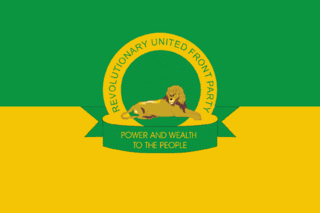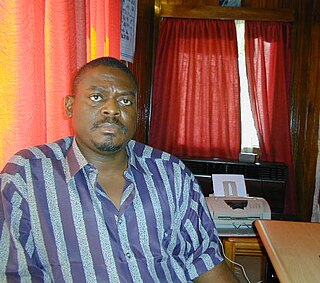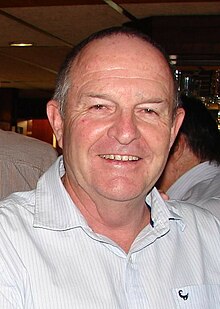Sierra Leone first became inhabited by indigenous African peoples at least 2,500 years ago. The Limba were the first tribe known to inhabit Sierra Leone. The dense tropical rainforest partially isolated the region from other West African cultures, and it became a refuge for peoples escaping violence and jihads. Sierra Leone was named by Portuguese explorer Pedro de Sintra, who mapped the region in 1462. The Freetown estuary provided a good natural harbour for ships to shelter and replenish drinking water, and gained more international attention as coastal and trans-Atlantic trade supplanted trans-Saharan trade.

The Republic of Sierra Leone Armed Forces are the armed forces of Sierra Leone, responsible for the territorial security of Sierra Leone's borders and defending the national interests of Sierra Leone, within the framework of the 1991 Sierra Leone Constitution and International laws. The armed forces were formed after independence in 1961, on the basis of elements of the former British Royal West African Frontier Force, then present in the Sierra Leone Colony and Protectorate.

Foday Saybana Sankoh was the founder of the Sierra Leone rebel group Revolutionary United Front (RUF), which was supported by Charles Taylor-led NPFL in the 11-year-long Sierra Leone Civil War, starting in 1991 and ending in 2002. An estimated 50,000 people were killed during the war, and over 500,000 people were displaced in neighboring countries.

The Revolutionary United Front (RUF) was a rebel group that fought a failed eleven-year war in Sierra Leone, beginning in 1991 and ending in 2002. It later transformed into a political party, which still exists today. The three most senior surviving leaders, Issa Sesay, Morris Kallon and Augustine Gbao, were convicted in February 2009 of war crimes and crimes against humanity.

Sandline International was a private military company (PMC) based in London, established in the early 1990s. It was involved in conflicts in Papua New Guinea in 1997 and had a contract with the government under then-Prime Minister Julius Chan, causing the Sandline affair. In 1998 in Sierra Leone Sandline had a contract with ousted President Kabbah and in Liberia in 2003 was involved in a rebel attempt to evict the then-president Charles Taylor near the end of the civil war. Sandline ceased all operations on 16 April 2004.

The Mil Mi-24 is a large helicopter gunship, attack helicopter and low-capacity troop transport with room for eight passengers. It is produced by Mil Moscow Helicopter Plant and was introduced by the Soviet Air Force in 1972. The helicopter is currently in use by 58 countries.

Alhaji Ahmad Tejan Kabbah was a Sierra Leonean politician who served twice as the 3rd President of Sierra Leone, from 1996 to 1997 and again from 1998 to 2007. An economist and attorney by profession, Kabbah spent many years working for the United Nations Development Programme. He retired from the United Nations and returned to Sierra Leone in 1992.

Major Johnny Paul Koroma was a Sierra Leonean military officer who was the head of state of Sierra Leone from May 1997 to February 1998.

Executive Outcomes is a private military company (PMC) founded in South Africa in 1989 by Eeben Barlow, a former lieutenant-colonel of the South African Defence Force. It later became part of the South African-based holding company Strategic Resource Corporation. The company was reestablished in 2020.

Operation Barras was a British Army operation that took place in Sierra Leone on 10 September 2000, during the late stages of the nation's civil war. The operation aimed to release five British soldiers of the Royal Irish Regiment and their Sierra Leone Army (SLA) liaison officer, who were being held by a militia group known as the "West Side Boys". The soldiers were part of a patrol that was returning from a visit to Jordanian peacekeepers attached to the United Nations Mission in Sierra Leone (UNAMSIL) at Masiaka on 25 August 2000 when they turned off the main road and down a track towards the village of Magbeni. There the patrol of twelve men was overwhelmed by a large number of heavily armed rebels, taken prisoner, and transported to Gberi Bana on the opposite side of Rokel Creek.
The Sierra Leone Civil War (1991–2002), or the Sierra Leonean Civil War, was a civil war in Sierra Leone that began on 23 March 1991 when the Revolutionary United Front (RUF), with support from the special forces of Liberian dictator Charles Taylor's National Patriotic Front of Liberia (NPFL), intervened in Sierra Leone in an attempt to overthrow the Joseph Momoh government. The resulting civil war lasted 11 years, enveloping the country. It left over 50,000 dead.
Al J. Venter is a South African war journalist, documentary filmmaker, and author of more than forty books who also served as an Africa and Middle East correspondent for Jane's International Defence Review. The surname is pronounced "fen-ter".
Operation Khukri was a multinational operation launched in the United Nations Mission in Sierra Leone (UNAMSIL), involving India, Ghana, Britain and Nigeria. The aim of the operation was to break the two-month-long siege laid by armed cadres of the Revolutionary United Front (RUF) around two companies of 5/8th Gorkha Rifles Infantry Battalion Group of the Indian Army at Kailahun by effecting a fighting breakout and redeploying them with the main battalion at Daru.
The United Kingdom began a military intervention in Sierra Leone on 7 May 2000 under the codename Operation Palliser. Although small numbers of British personnel had been deployed previously, Palliser was the first large-scale intervention by British forces in the Sierra Leone Civil War. In early May 2000, the Revolutionary United Front (RUF)—one of the main parties to the civil war—advanced on the country's capital, Freetown, prompting the British government to dispatch an "Operational Reconnaissance and Liaison Team" (ORLT) to prepare to evacuate foreign citizens. On 6 May, the RUF blocked the road connecting Freetown to the country's main airport, Lungi. The next day, British soldiers began to secure the airport and other areas essential to an evacuation. The majority of those who wished to leave were evacuated within the first two days of the operation, but many chose to stay following the arrival of British forces.
Peter Alfred Penfold was a British diplomat who was the second youngest governor of the British Virgin Islands and was High Commissioner to the Republic of Sierra Leone. His career began in 1963, when he joined the Foreign Service as a clerical officer. Two years into his career, he was posted to the British embassy in Bonn, West Germany, and two years after that to Nigeria. From 1970 to 1972, Penfold served as a "floater" in Latin America, filling in as necessary for staff at British missions in the region. He served in Mexico during the 1970 football world cup, and on St Vincent, where he was responsible for organising an evacuation after a volcanic eruption. After Latin America, Penfold briefly served in Canberra, before returning to London to take a post in the Foreign and Commonwealth Office (FCO). He earned early promotion to second secretary in Addis Ababa, Ethiopia, where he was responsible for reporting on the Organisation of African Unity (OAU) and the Eritrean War of Independence and was still in the country during the revolution, in which the pro-Western emperor was overthrown. After completing his tour in Ethiopia, Penfold served as information officer in Port of Spain and then as first secretary in the West Africa Department of the FCO.
David Alan Jones is a retired British diplomat who was High Commissioner to Sierra Leone during the British military intervention in the Sierra Leone Civil War.
The Lungi Lol confrontation was a confrontation between British forces and the Revolutionary United Front (RUF) in Sierra Leone on 17 May 2000.

Major Arthur Walker HCG and Bar, SM was a South African Air Force helicopter pilot who was twice awarded the Honoris Crux Gold decoration during the South African Border War. The Honoris Crux Gold was the highest military award for bravery awarded to members of the South African Defence Force.

Canada–Sierra Leone relations refer to bilateral relations between Canada and Sierra Leone. Ties were first established in 1961, when Sierra Leone gained its independence. Canada is represented in Sierra Leone through its High Commission in Accra, Ghana. Sierra Leone is represented in Canada through its embassy in Washington, D.C.

The United Nations Observer Mission in Sierra Leone (UNOMSIL) was a United Nations peacekeeping operation in Sierra Leone from 1998 to 1999 that was established with the passage of United Nations Security Council Resolution 1181. Its mission was to monitor the military and security situation in Sierra Leone. The mission was terminated in October 1999, when the Security Council authorized deployment of a new, and significantly larger peacekeeping operation, the United Nations Mission in Sierra Leone (UNAMSIL).













